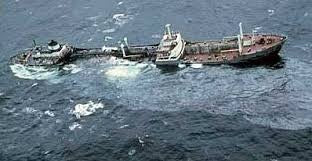The Odyssey Oil Spill: A Forgotten Tragedy That Burned at Sea
Ashton Routhier
Share
On November 10, 1988, a fireball erupted in the heart of the North Atlantic. The oil tanker Odyssey, once called the Oriental Phoenix, split in two during a violent storm 700 miles off the coast of Nova Scotia. It sank beneath the waves with over 43 million gallons of Brent crude oil—a volume more than four times that of the Exxon Valdez spill.
Yet outside of maritime circles, few know its name. Fewer still remember the 27 crew members who perished that night.
Lost at Sea, Lost in Memory
The Odyssey was a 65,000-ton Liberian-flagged tanker en route from the Sullom Voe terminal in the Shetland Islands to Newfoundland’s Come-by-Chance refinery. Heavy weather struck—25-foot waves, 44-mph winds—forcing the crew to issue a distress call. A Russian weather ship, Passat, responded swiftly and arrived at the scene within an hour. But it could only watch from a mile away as the tanker burned uncontrollably. The surrounding oil slick had ignited, creating a wall of flame around the wreck.
There were no survivors. All 27 seafarers—15 Greeks, 12 Hondurans—were presumed dead.
The ship’s stern sank first. The bow held on briefly, then followed into the deep. The fire burned itself out. And so did the headlines.
No Shoreline, No Cleanup
With no landfall in sight, the spill was deemed a non-threat. Canadian Coast Guard aircraft observed the fire and later the wreck, but no formal cleanup was launched. Officials believed the rough seas and open ocean would disperse the oil naturally.
Some of it did. But a toxic slick measuring 10 miles by 3 miles initially formed. Ocean currents carried the remnants eastward across the Atlantic, likely diffusing the oil before it could reach European coasts. Still, its ecological impact was immediate and long-lasting.
Marine scientists later warned that krill populations in the region were severely affected, potentially disrupting entire food chains that relied on them—from fish and seabirds to whales. In cold, nutrient-rich waters like these, such foundational losses can ripple through generations.
The Unseen Cost of Distance
Why was so little done? Because the spill happened “far away.” It posed no threat to coastal tourism or fisheries. There were no images of oil-soaked birds or blackened beaches. And so it was quietly logged, studied, and shelved.
But consider what could have happened had the winds shifted. Had the spill moved toward the Canadian coastline, the consequences would have been catastrophic:
- Drinking water supplies from coastal desalination plants could have been contaminated or shut down.
- Power generation systems—many of which rely on seawater cooling—might have failed.
- Fisheries and marine sanctuaries, especially in Newfoundland and Nova Scotia, could have suffered irreversible losses.
- Ports and shipping routes could have been closed, disrupting vital trade and economic activity.
We came dangerously close to a full-scale environmental and economic emergency. The only difference was wind direction.
An Industry-Wide Failure
The Odyssey was not a rogue vessel. It was a registered tanker, operating under a known owner, in commercial waters. And yet questions remain unanswered:
Was the ship structurally sound?
Had maintenance been deferred after its recent ownership change?
Was it adequately equipped for a North Atlantic crossing during storm season?
These are not hypothetical concerns—they're industry-wide accountability issues. Offshore distance should never be an excuse for delayed inspections, overlooked regulations, or under-trained crews. The maritime industry must treat every vessel as if it sails within sight of land. Because human lives—and our oceans—are always in reach.
In Memory, A Responsibility
The Odyssey oil spill was not just an environmental event—it was a human tragedy. 27 souls were lost at sea, many of whom likely had no chance to escape the explosion or flames. They were fathers, sons, husbands—people doing their jobs under dangerous, under-regulated conditions.
To this day, there is no memorial to those who died. No maritime safety overhaul tied to this disaster. No global recognition of what was lost.
We can’t rewrite that night in the Atlantic—but we can honor it. We do so by demanding better: better ship maintenance, better safety standards, and better global response coordination. For the lives lost. For the oceans still at risk.
